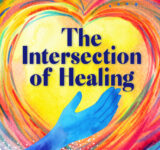The heart, the spirit, trauma, and metanoia: transformation beyond mindset shifts.
by Christina Stäudle
Transformation often focuses on shifting thoughts and behaviors, but for many, this approach falls short. Lasting change requires healing and alignment at the deepest level—where the heart, spirit and identity intersect.
The heart is more than an emotional center; it is the place where body, soul and spirit overlap. The spirit carries a person’s original design, but when wounded or fragmented, it becomes difficult to live from that place. Trauma, false beliefs and life experiences can displace identity, leading to cycles of frustration, self-sabotage or emotional numbness.
Metanoia is often defined as a change of mind, but in reality, it is both healing and transformation—a process that restores a person’s spirit to wholeness and allows them to fully embody their true identity.
This article explores how the heart and spirit interact with trauma, how a broken spirit prevents transformation, and why metanoia is the key to deep, sustainable change.
The Heart: Where Body, Soul and Spirit Overlap
The heart is often mistaken as just a metaphor for emotions, but it is the convergence point of the entire being. It is where:
- The body processes sensations and stores trauma at a cellular
- The soul forms belief systems and emotional
- The spirit carries original identity and divine
Because the heart is where all three dimensions of human existence meet, transformation must engage more than just thoughts. Surface-level mindset shifts may provide temporary relief, but if the heart remains fragmented or burdened, the same struggles will resurface.
The Spirit: The Seat of True Identity
The spirit is not just an abstract concept—it has consciousness. Some call it the supraconscious mind, a level of awareness beyond rational thought, tied to intuition, purpose and deep knowing. It is also closely connected to the energetic level of existence, the unseen force that sustains life, presence and vitality.
Unlike the soul, which is shaped by experiences, the spirit carries an untainted blueprint of identity. This is why a person’s deepest sense of self does not come from external labels or life circumstances but from a place beyond them.
When the spirit is whole and aligned, life flows with clarity and purpose. But when trauma or oppression wounds the spirit, identity becomes distorted, and a person may feel lost, disconnected or trapped in patterns they cannot escape.
A Broken Spirit
A broken spirit is not just emotional distress—it is a displacement of identity that makes it impossible to live from truth and one’s original design.
How Trauma Breaks the Spirit and Misplaces Identity:
- Early rejection or abandonment may lead to an internalized identity of
- Repeated abuse can create a sense of powerlessness that keeps a person from stepping into their true authority.
- Performance-driven environments may instill the belief that value is conditional on achievement, leading to a lifetime of striving.
These false identities take root at the spirit level, not just in thought patterns. As a result, even when a person logically understands their worth, they may struggle to feel it at a deep level.
Symptoms of a Broken Spirit:
- A constant sense of disconnection from self and
- Feeling stuck in repeating cycles, despite efforts to
- Emotional numbness or an inability to experience joy, peace or
Mindset work alone does not address these wounds because they exist beyond the level of thoughts. Identity must be restored at the spirit level, allowing transformation to flow naturally rather than through forced effort.
Metanoia: The Process of Healing and Transformation
True metanoia is not just about thinking differently—it is about returning to the original design. Healing and transformation are not separate processes; they are two sides of the same movement.
Healing is not about fixing something broken—it is about bringing back what was lost. This means:
- Releasing false identities formed through trauma or
- Allowing the heart to return to a place of trust and
- Realigning with the deep knowing of the spirit rather than operating from conditioned
Once healing has occurred, transformation becomes effortless because the shift is no longer just cognitive—it is embodied. Instead of striving to maintain change, a person begins to live from a new foundation.
The process of metanoia follows four key phases:
- Recognition → Identifying false identities and
- Healing → Releasing pain and restoring the heart’s alignment with the
- Realignment → Learning to operate from a renewed
- Transformation → Living from wholeness rather than
Example: Healing Through Spirit-Led Alignment
A former client of mine struggled with self-condemnation and frustration having difficulty shaking off feelings of regret, even though they knew intellectually they were being too hard on themselves.
Using a guided visualization exercise, they were led to connect with their spirit:
“Kassy, I understand that you feel frustrated because you wanted to achieve more.
“I understand that at the moment this frustration is hard to let go.
“But I want to remind you of the truth: You are loved. You are fully validated. You are enough. You don’t need to prove a thing. I love you. And I give you permission to let go of shame and self-condemnation.”
The moment their spirit gave permission for the soul to release frustration, the emotional weight lifted. This exercise worked because it did not rely on forcing a mindset shift—instead, it engaged the spirit’s authority to bring the soul into alignment.
Example: Going Deeper Spiritually through a Christian Lens
From a biblical perspective, the spirit is not just an energetic force but a direct imprint of God’s design. Scripture repeatedly points to the need for identity restoration, not just behavior modification.
Biblical foundations of identity in the spirit include:
- Psalm 139:16 – “All the days ordained for me were written in Your book before one of them came to be.”
- Ezekiel 36:26 – “I will give you a new heart and put a new spirit in ”
- Isaiah 61:1 – “He has sent me to bind up the ”
Jesus did not call people to simple behavior shifts—He called them to metanoia, a complete restoration of identity. His ministry was filled with moments where He spoke to the spirit of a person, calling them back to their true self.
Practical Steps for Christian Coaches and Mentors:
- Guide clients to identify where their spirit has been displaced by false
- Invite them into inner healing through prayer and truth-based
- Teach them to listen to the Holy Spirit rather than relying on mental processing
Next Steps
Transformation at the deepest level requires more than shifting thoughts—it involves realigning identity, healing the spirit and restoring the heart’s connection to truth. Whether working with clients on resilience, personal growth or self-leadership, creating space for true metanoia allows for sustainable, identity-driven change rather than temporary breakthroughs.
Self-reflection:
- Am I engaging with my spirit in my personal life, or do I find myself primarily operating from my emotions, thoughts or past conditioning?
- Where do I sense misalignment between my spirit and the way I approach transformation—both in myself and in my work with clients?
- How can I cultivate a deeper awareness of my spirit so that I live and work from a place of wholeness rather than striving?
Coaching Reflection:
- How can I better recognize when a client is operating from their soul rather than their spirit, and what approach will help them shift into deeper alignment?
- Am I guiding clients into true restoration, or am I unintentionally reinforcing surface-level solutions that bypass the spirit?
- What changes can I make in my coaching approach to ensure that transformation flows from identity restoration rather than behavior correction?
If you’re ready for deeper exploration of spirit-aligned coaching techniques, consider integrating these principles into your practice. True transformation happens when identity is restored and lived out authentically.
Christina Stäudle is a trauma-informed psychotherapy practitioner, TA Master Transformation Coach, and founder of Mission Transformation International. Known as Mrs. Antifragility, she equips individuals to break free from toxic cycles, build authentic purpose, and grow through adversity with grace and strength. Her work blends self-leadership, resilience, and soul-deep transformation—empowering emerging leaders to move from survival into sustainable impact. Christina is based in Germany and East Africa. You can connect with her on LinkedIn: https://www.linkedin.com/in/christina-stäudle-mt.





